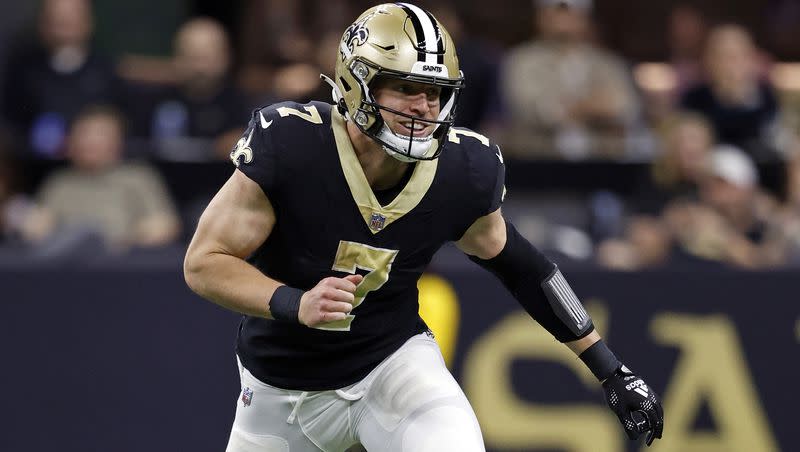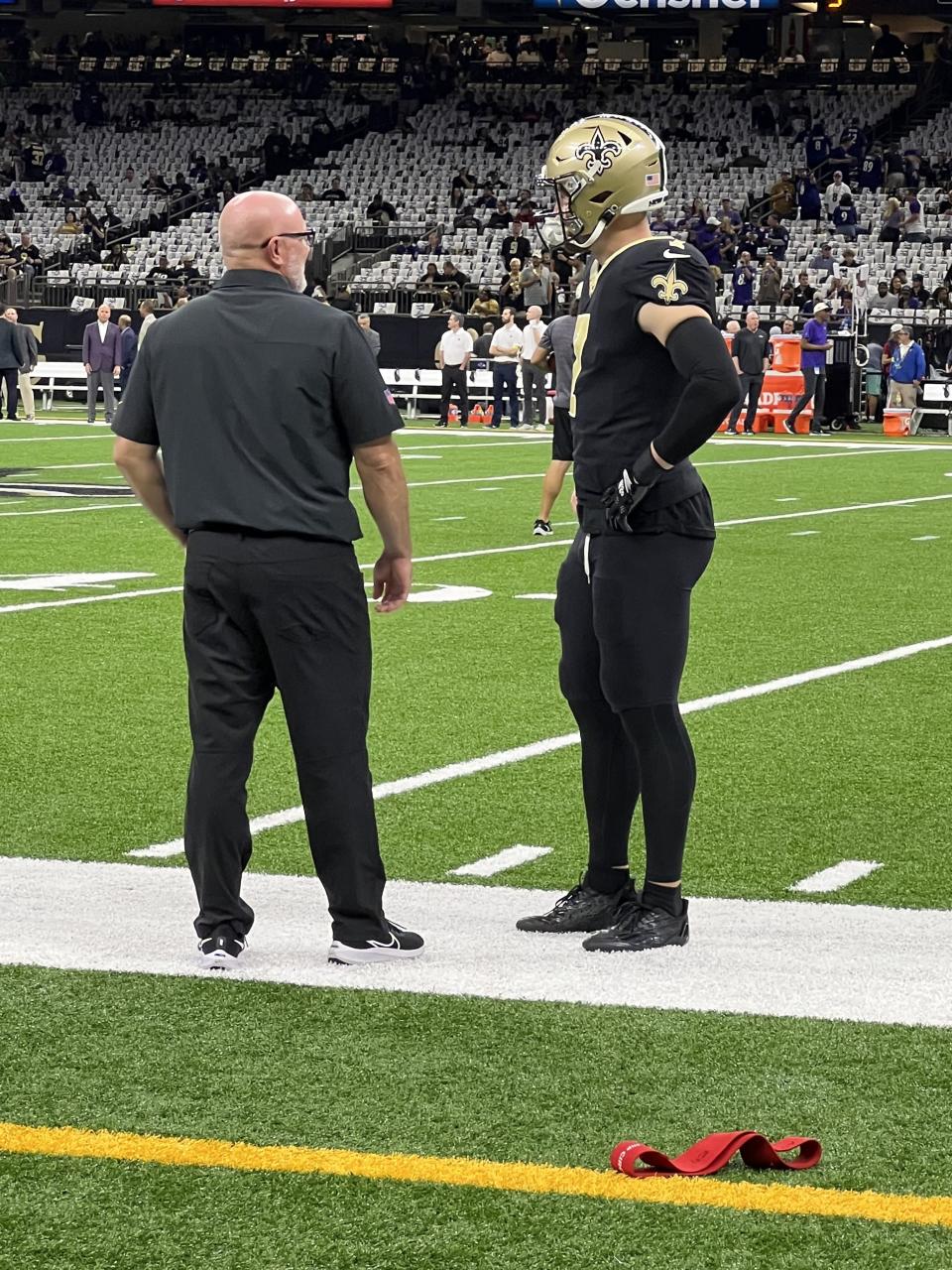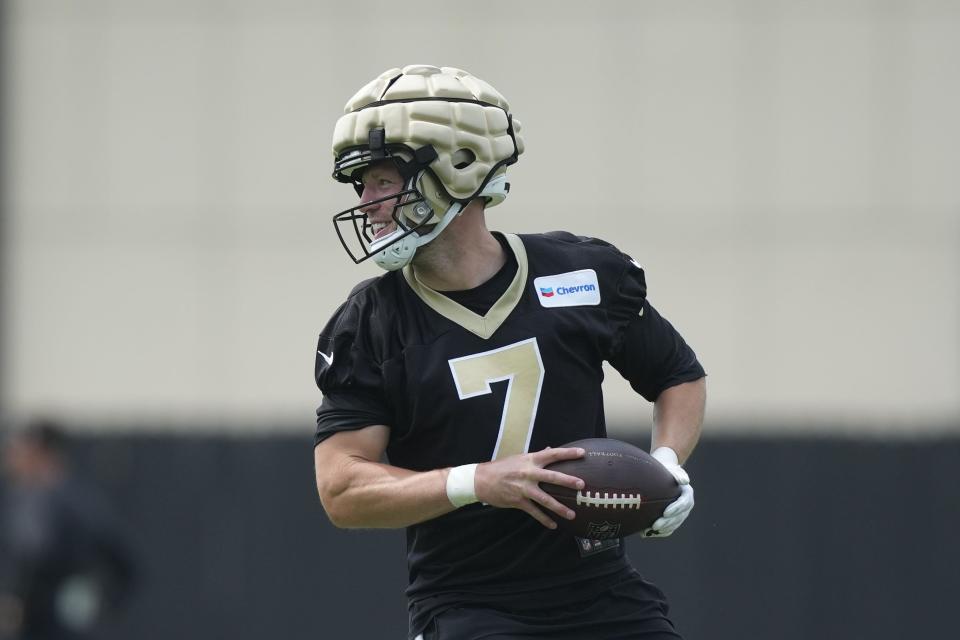What Taysom Hill is doing to stay game-ready

It’s well-chronicled that during Taysom Hill’s five seasons at BYU, he suffered four season-ending injuries.
Because of that, back then many wondered if Hill, despite his otherworldly athletic abilities, had a future in the NFL. Could he stay healthy?
But he’s proven those doubters and detractors wrong.
In fact, Hill has made his own distinct mark on the league. He’s become the modern-day NFL poster boy for versatility, athletic prowess and uniqueness. Known as the “Swiss Army knife,” Hill plays an unheard-of six positions — quarterback, running back, tight end, wide receiver and two different roles on special teams with the New Orleans Saints.
Fortunately for Hill, 32, who’s entering his seventh season in the NFL, there’s a “mad scientist,” as he calls him, in his corner. A man that he completely trusts. He’s helped bolster Hill’s training regimen, kept him healthy and maximized his abilities.
His name is Matt Rhea, a Tooele native and Southern Utah University graduate, who’s in his second season as the Saints’ director of sports science.
As Rhea says, Hill is a different breed of athlete. As Hill says, Rhea is a different breed in the world of sports science. It’s an ideal working relationship.
Before Rhea — who earned his doctorate of philosophy in 2004 from Arizona State with an exercise and sport science academic focus and an athletic performance enhancement research focus — joined the Saints, Hill didn’t know much about him. Even at this stage of his career, Hill is learning and evolving.
Hill recalls the first time he met Rhea and came away impressed.
“I went into it really open-minded and then talking to him solidified everything I had heard. The other thing is that all the feedback I’d been given from every coach that interviewed him and worked with him, our strength coaches stayed the same from the previous guy to Matt, whom I’m close with,” he said. “Their feedback after working with him after a few short months was insanely positive.
“I’ve had all these other conversations so I went into it really excited having the opportunity to work with him. There was no, I need to feel this guy out because the feedback was so positive. After working with him, I realized why the feedback was what it was.
Related
“I’ve done a ton of different workouts with a ton of different strength coaches,” Hill continued. “The first time I met him, I could tell how genuine he was and then I started talking to him about the science about his plan and his program.
“It made so much sense to me. I’d had all these other experiences from a weightlifting standpoint, running, all that stuff. Then I sat and talked to him and I felt like it all kind of clicked, based on the research that he had done and why he did what he did. It kind of put it all together for me.”
‘He’s the strongest guy I’ve ever worked with, pound for pound’
Hill, like many athletes growing up, didn’t ask a lot of questions about training methods. He would just show up and do the workout.
But Rhea has helped change the way Hill views his body and sports science in general.
“For me, Matt has opened up my eyes to a lot of the ‘why’ we’re doing things, specifically from a workout standpoint,” Hill said. “He’s been very informative. He’s kind of become the mad scientist a little bit to me where there’s no theory behind it and I’ll sit with him and he’ll show me all this data on his computer screen. ‘Hey, these numbers are really good with what you’re doing. These numbers could be better.’

“As we move forward through the offseason, these workouts are going to be tailored to increase this. The biggest thing to me that I’ve realized is, it’s not all about, it’s a big part of, how much weight you can lift and how strong you are, but there’s this whole other piece about training the brain and this dynamic movement that Matt taps into based on the numbers and the data that he’s collecting in your movement. That’s really been eye-opening to me. It’s been really fun.”
Rhea enjoys working with Hill, who is not your typical pro athlete.
“There’s so many things you can do with him. But you don’t want to put him in situations where maybe it puts too much of a pounding on his body. I’m really intrigued by how versatile he is from a physiological standpoint,” Rhea said. “He’s the strongest guy I’ve ever worked with, pound for pound.
“He’s got a really, really good acceleration. He’s strong, big and fit. He’s got a great acceleration that is more indicative of a small, quick-burst type of athlete. His top speed is good. But that’s been the area he’s put the most work into, when he gets into the open field and needs to run away from small guys.
“His speed’s actually improved in the last year. He’s got this skill set that is a mixture of four different traditional position guys,” he continued. “Sometimes we talk about guys being ‘freaks.’ In the sports world, that is an absolute compliment. It’s unique. It’s definitely not normal.”
‘It’s been invigorating for me and my career’
Under the direction of Rhea, the way Hill works out, during the offseason and during the season, is different from what he’s been accustomed to.
“Now that I’m 32 years old and I’m entering my seventh season, it’s been really great and fun because a lot of the workouts he’s having me do, I’ve never done before,” he said. “Which is pretty unique, having played five years at BYU and six in the NFL. It’s been really invigorating for me and my career, frankly.”
Hill offered an example of a new exercise that he’s been doing — hang clean weightlifting.
“It’s such a standard lift,” said Hill. “Any university or NFL team will do some element of hang clean.”
With Rhea, Hill started doing hang cleans with box step-ups.
“As you do the clean, one of your legs is going up onto a box and you complete that box step up and then back down,” said Hill. “He’s adding a core strength exercise that’s training this explosive movement that you need; then he’s adding this other element where it’s training your brain because when you run, that’s the movement that you’re doing.
“He’s training not only your physical strength but he’s also training your brain to move,” Hill continued. “It’s not just a strength exercise, it’s now a coordination exercise. I’ve never done anything like that before.”
Hill’s history
As mentioned, Hill saw four seasons at BYU end prematurely, mostly due to fluke injuries. In 2014, for example, Hill was considered a Heisman Trophy candidate as he led BYU to a national ranking and a 4-0 start, including a memorable victory at Texas.
But in the fifth game of the season, with the Cougars trailing Utah State 21-14 late in the first half, Hill had his left leg rolled up on after a two-yard run. Hill was helped up by a teammate but immediately went to the sideline. Trainers fitted him with an air cast and carted him to the locker room.
Hill had surgery early the next morning.
A couple of days after the surgery, coach Bronco Mendenhall told reporters that the injury was worse than originally believed, and that “every major ligament” in the leg had been shredded.”
Hill later downplayed that description but it took him six months to recover.
Of course, Rhea knows all about Hill’s injury history.
“I do think there’s a lot to learn looking at what’s happened in the past,” Rhea said. “But with cases like that, when there are a lot of different freak injuries that happen, you have to chalk it up to it being part of the sport. You don’t want to get too distracted by things that maybe weren’t controllable.”
Rhea relishes his relationship with Hill.
“He’s definitely one of my favorite athletes to work with. Great work ethic. He has been really fun to work with because he’s been open to changing some of the things I wanted to change,” Rhea said. “It’s another good example of a guy that’s been really successful. He continues to play at a really high level. He’s always willing to look at new things and do things differently if it means that there could be some value in performance.
“There’s some value in that type of lesson that sometimes we get too comfortable in things we like and do well. Sometimes, we have to adjust those things. When an athlete that’s as successful as him is open to that, it makes the job really enjoyable.”
‘The hardest thing in all of football’
Rhea references the six positions that Hill plays but adds, “there may be more than that.”
Working with an elite athlete like Hill that plays so many positions is a fun challenge for Rhea.
“From a sports science standpoint, it’s coordinating all the different strategies and development that needs to happen,” said Rhea. “That’s probably why I’m so intrigued and connected with him because it’s got to be the hardest thing in all of football to do, to do that many things and to have your body ready to do that many different things. The motivation for me is that challenge. I’m just glad I don’t have to go out there and run into defensive linemen that are as big as they are now in the NFL.”
Rhea explained that the way he works with Hill is “a highly individualized process.” Every athlete he trains has a program tailored to them.
“For Taysom, because he has to do very different things — six different positions — he’s got to be able to perform in certain ways that are incredibly versatile. You can’t neglect any of those areas,” he said. “The challenge in developing a program like that is putting enough time in every different aspect. The workouts end up being pretty substantial.
“I’ll give him credit that when you have to focus on that many different things, you need to take care of your body outside of lifting and the recovery part is just as important,” he continued. “Being willing to do a two-and-a-half-hour workout, they’re not always that long, but there are times when you have to address so many different things that it takes the work ethic of a highly driven, elite athlete. That’s him in a nutshell.”
Relationship beyond football
Off the field, Hill and Rhea share some bonds even stronger than football. They’re both Latter-day Saints and they’re from the West. And they both want to be the best husbands and fathers they can be.
Both Hill and Rhea say there are plenty of NFL players that have a strong Christian faith, and family men. They have deep connections with those athletes as well.
“There’s probably a misconception about a lot of professional athletes. There are knuckleheads out there but in my experience, they’re good people and they want to be good people and they love their families,” Rhea said. “Those close relationships are not that unique. But it’s something that reminds me of having young kids and seeing Taysom be a good husband and father that transcends sports.
“It’s something we connected with and just some fun conversations about Utah and playing sports and growing up in the West. There are things that we definitely have deeper connection because of our faith. I hope that transcends sports and the job. The best thing about this job are those types of relationships.
“You see guys who are highly driven. They all face significant challenges, whether it’s injuries or family issues and the stresses of life,” Rhea added. “They want to be great at their jobs but they also want to be great in other things. You develop a relationship with them where we actually talk about personal matters than we talk about the weight room. Those are good things about the job that I really appreciate.”
For Hill, he enjoys talking to Rhea about topics outside football and sports science.
“I have two children. Family is really important to me,” he said. “Matt’s older and he’s been through all that. From a personal standpoint, there’s a lot of things that he can relate to that I’m going through. That’s probably the biggest thing.”
Remaining healthy and productive
If there’s anybody that can appreciate the importance of staying healthy, it’s Hill.
That’s something he thinks about and Rhea helps him be as prepared as possible for what the physical toll of a season can bring.
“The conversations Matt and I have is,” Hill said, “how can we put together an offseason program, and an in-season program that keeps your body well-balanced, that keeps you in shape, that keeps you strong.”
When he was at BYU, he was asked constantly about his health. He gives the same answer now that he gave then.
“I believe that this game is too demanding. You can only play it one way and you really have to play it with all the energy that you have. With emotion. If you don’t do that, you’re just not going to make it,” he said. “It’s too competitive of a league and too competitive as a sport and it requires so much of you.
“ … Beyond health and stuff, as I get ready for games, I don’t personally think about (injuries). We certainly have a lot of conversations about how we put together this training program so you’re strong and in shape to prevent them, especially muscle tissue injuries.”
Rhea relies heavily on science and research to facilitate that process.
“The thing that separates Matt is how data-driven he is. He doesn’t do anything without data to back it up. If there’s a workout or a lift or an exercise or a warmup you’re doing, it’s because he’s seen deficiencies in the data that he’s collected. I think the biggest thing is, why he does that, is because he cares,” Hill said. “That is his greatest quality.
“He works really hard. He sifts through all of that data so he can get the players in the best position to be as good as they can be. Not because he wants to look good. But because he wants to see his guys succeed. Those two things are interconnected. He spends the extra time and he does the research because he wants to see these guys — me, I’m one of them — as good a player that I possibly can be.”
When you’re a different breed of athlete, like Taysom Hill, it’s good to have a different breed of sport scientist, like Matt Rhea, in your corner.


